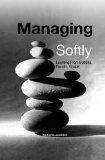I finally bit the bullet and tackled some of my back-log of non-fiction reading. I've been spending most of my free reading time on the Discworld by Terry Pratchett. That being said, I've just zipped through a couple non-fiction titles of note, The 50th Law by 50 Cent and Robert Greene, and Managing Softly
by Bertrand Jouvenot. Both are quasi business/life-skills type books. Following is a quick-hit summary of each.
The 50th Law

The premise of The 50th Law
is fairly straight-forward: live a fearless life being yourself and doing your thing and success and happiness will be yours. Well, success at least, and hopefully happiness. Overall, the book is fairly logic, building on the direct experiences of 50 Cent. Co-author Greene spent the better part of a year interviewing and shadowing 50 in order to get a feel for his style, and then wrote the book.
Here are a couple quotes from the introduction that I found most interesting:
"We are the animal that cannot get rid of its fears and when so many of them lay inside us, thses fears tend to color how view the world." (p5)
"We are living through strange, revolutionary times. The old order is crumbling before our eyes on so many levels. And yet in such an unruly moment, our leaders in business and politics cling to the past and the old ways of doing things. They are afraid of change and any kind of disorder." (p17-18)
"The 50th Law: The Greatest fear people have is that of being themselves." (p18)
The book then proceeds to spell out just how to find success living the 50th law. Those 10 chapters are:
Ch. 1: Intense Realism
Ch. 2: Self-Reliance
Ch. 3: Opportunism
Ch. 4: Calculated Momentum
Ch. 5: Aggression
Ch. 6: Authority
Ch. 7: Connection
Ch. 8: Mastery
Ch. 9: Self-Belief
Ch. 10: The Sublime
Overall, I think the book is a decent read, and it's definitely good material for someone looking for a different path forward. I sometimes question the necessity of the brutality and aggression advocated, but certainly understand the context. Given the end of trust in civilization, these rules seem increasingly important, no matter how hard they may be to palate.
Managing Softly

In absolute contrast to The 50th Law, I also read Managing Softly: Learning From Buddha, Gandhi, and Gracie
Quite different, and yet similar, it advocates 7 principles of so-called "Non-Violence Principle Management" (the English translation of this book was a bit challenging to read, btw, as the author's primary language appears to be French and the translation editor wasn't overly diligent).
In a nutshell, this book looked at the lives of Buddha, Gandhi, and Rickson Gracie to draw 21 lessons that could be rolled into 7 principles of the "NVP Management" approach. While I think the book was interesting, it was (again, due to translation) a bit difficult to read, even though it was only 113 pages.
The 21 lessons sum up as follows:
Buddha
1. Be out of time
2. Revolution is a long, lasting and never ending process
3. The more noble the quest, the bigger the number of disciples
4. The bigger the opponents, the bigger the rewards
5. Fathers, masters and usual leaders must be overpassed
6. Manage by possible, not by example
7. Wealth is not in the banks
Gandhi
1. What if children were right?
2. Replace Brain, guts and energy by mind, heart and body
3. Have a global crusade beyond the fights
4. Action as language
5. Art is the winner
6. Diet for body, mind and heart
7. Wear like you are
Gracie
1. Use more than only a third of yourself
2. Show you are ready to lose life for your crusade
3. Listen inside as much as outside
4. Legend is growing, the man remains the same
5. Never promise, just deliver, no more
6. Breath
7. Avoid easiness
If you want to know more about what these means, then read the book. I think a few of these are translated incorrectly, but you get the general idea, with the description that follows the headlines bringing the point around better.
These all roll into the 7 principles of the Non-Violence Principle (NVP) Management approach, broken into internal and external principles, as follows:
Internal
1. Body and the Life Principle
2. Mind and the Wisdom Principle
3. Heart and the Harmony Principle
External
4. Air and the Infinity Principle
5. Water and the Flowing Principle
6. Earth and the Concordance Principle
7. Fire and the Ivy Principle
I'll stop short of calling this new age tripe, but let's be honest here: this is a fairly touchy-feely approach to management that, while perhaps useful, needs to be balanced out against the realities of any given business. I remain unconvinced after reading the book. Of the 21 principles learned from Buddha, Gandhi, and Gracie, only the last 7 (Gracie's) resonated much with me, and mainly because I practice Gracie Jiu-jitsu.
Conclusions
The 50th Law - Recommend - it tells a good story, and provides good exhortation, with a message that is particularly needed these days
Managing Softly - Neutral - due to translation, it's a difficult read at times - overall, the message seems decent, though it's a bit zealous and fan-boyish - certainly not an objective, scientific study of management principles - it would have been nice to see these principles tested in a real-world business management scenario
